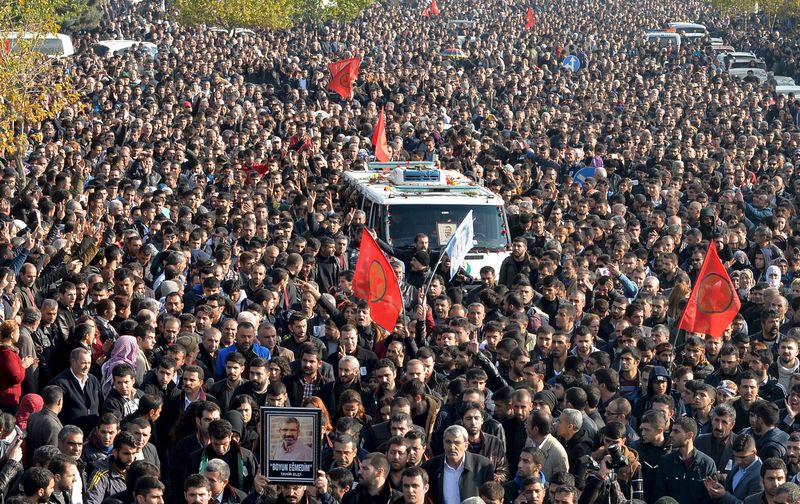By Seyhmus Cakan
DIYARBAKIR, Turkey (Reuters) - Mourners at the funeral on Sunday of Tahir Elci, a Kurdish lawyer and human rights activist gunned down a day earlier in Turkey's volatile southeast, said they were sceptical that those responsible for his killing would be brought to justice.
Funerals also took place of two policemen killed in the attack in the city of Diyarbakir, the centre of unrest in the mostly Kurdish region.
Hundreds of people have been killed since a ceasefire between the Kurdistan Workers Party (PKK) and Turkish security forces collapsed in July, reigniting a conflict in which some 40,000 people have died since it began in 1984.
Prime Minister Ahmet Davutoglu said on Sunday the gun found next to Elci's body was the same weapon used in the attack on the police officers. He vowed to catch the killers.
But Selahattin Demirtas, co-chair of the pro-Kurdish People's Democratic Party (HDP), cast doubt on whether those responsible would be exposed.
"Our scepticism is fair as so many similar sufferings have taken place on our land in the past," he said at the funeral. "We were never able to say goodbye to them with our minds at ease thinking those responsible will be caught."
Elci, shot on Saturday after speaking to journalists, was facing trial for saying the banned PKK was not a terrorist organisation, as the government describes it. He had, however, denounced PKK violence.
Police surveillance camera footage showed policemen being shot at from inside a taxi, falling onto the ground before the passengers ran away. Another video shows plain clothes police shooting at two men running in the direction of where Elci was believed to be standing.
A statement from Diyarbakir's chief prosecutor's office said the bullet hit Elci in the neck and exited above his left eye. The bullet had been fired from a distance, the prosecutor said, without drawing any conclusions.
The driver of the taxi was detained, the statement said, while an arrest warrant was issued for a suspect identified only by the initials MG. Another suspect remained unidentified.
Elci's killing was likely to fuel further unrest.
A curfew had been called in the Sur district of Diyarbakir where the killing took place. On Sunday, security forces continued operations to drive back the youth wing of the PKK, removing barricades and trenches, with occasional gunfire and explosions heard.
HDP deputies and leaders of Turkey's local bar associations gathered at the funeral, where a casket draped in red, with bright yellow flowers, was carried by a dense crowd.
Members of the Diyarbakir Bar Association stood in front of the hospital from where the body was taken, holding a banner which said "We will not forget you," in Turkish and Kurdish.
Four investigators have begun work to determine whether the death was an assassination or the result of crossfire. Elci's brother Ahmet, however, was clear that Elci had been a target:

"My brother is not our first martyr and neither will he be the last," he said at the funeral. "As a Kurdish intellectual he was slain by the state. We have seen this state murdering Kurdish intellectuals throughout the history. But we will not give up and we will win."